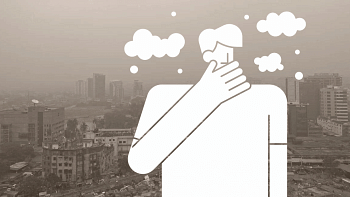Is health an individual or collective responsibility?

Lose weight. Stop smoking. Get more exercise. Avoid sweets. We receive all kinds of tips about what we should do to stay healthy. When we fall sick, we are told to go to the doctor and to take drugs. In other words, it's our responsibility to stay healthy and the responsibility of the medical establishment to cure us when we're sick. But what about a shared responsibility for our health across society, with individuals, the community, and government working together to achieve a positive outcome?
The importance of government policy, not just individual motivation, for health becomes evident when we consider the behaviours needed for a person to stay healthy. The biggest risks to our health are non-communicable diseases like cancer, stroke, heart disease, and diabetes. The major risk factors are tobacco and alcohol use, unhealthy diet, lack of physical activity, and air pollution. Other than pollution, the risk factors may appear to be within our control. But are they really?
If tobacco is inexpensive, we are inundated with ads for tobacco products and most places allow smoking. So, more people use tobacco than if strong policies were in place. When unhealthy foods like sugary drinks, chips, and fast food are widely available, heavily advertised, and cheaper than healthy foods, it is no wonder that people consume them in excess. When streets are dominated by motorised vehicles, parks are few and far between, and little to no good infrastructure exists for walking and cycling, most people will not get enough physical activity.
Governments need to pass good policies, not only within the health sector but for transport, urban planning, industry, environment, education, and so on. They need to carry out communication campaigns to help people understand what they can do to stay healthy. No matter how successful such efforts are, government hospitals and clinics will still be needed. Working on both to make it easier for people to stay healthy and to cure them when they fall ill is a huge responsibility.
Governments need to pass good policies, not only within the health sector but for transport, urban planning, industry, environment, education, and so on. They need to carry out communication campaigns to help people understand what they can do to stay healthy.
Fortunately, there is no need for it to be entirely the government's responsibility to ensure initiatives, policies, services, and infrastructure to keep the population healthy. Many other countries have established a health promotion foundation, usually semi-autonomous from the government, to carry out some of those roles while leaving the management of government health care operations to the health ministry.
Typically, a health promotion foundation carries out a number of important roles. In Thailand, for instance, ThaiHealth identifies gaps, then commissions research, engages stakeholders, ensures collaboration, advocates for supportive policies, carries out communication campaigns, and provides funding to institutes, universities, and organisations to improve population health.
Sounds great, but who would fund all that? The budget of ThaiHealth is roughly $120 million a year. Most health promotion foundations, including ThaiHealth, are funded directly from a dedicated tax on tobacco and alcohol. The money goes straight to the foundation, rather than through government revenues, and thus is not susceptible to annual budgetary negotiations.
Is the idea of establishing a health promotion foundation that can carry out important functions to help Bangladeshis stay healthier, funded through a dedicated tax on unhealthy products, relevant here? Are there any potential downsides to investing more money and energy into helping people stay healthy? Surely, as we transition into a middle-income country, health should gain emphasis. As the need for curative care expands exponentially, good options for reducing costs while improving services are needed.
Establishing a health promotion foundation will not be a miracle cure to all that ails us, but it could play an enormous role in assisting people throughout the country to live a healthier life; even without the assistance of a nagging doctor or friends proffering well-intentioned but unwelcome advice.
Debra Efroymson is senior advisor to Canadian public health NGO HealthBridge.


 For all latest news, follow The Daily Star's Google News channel.
For all latest news, follow The Daily Star's Google News channel. 









Comments